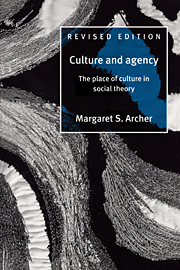Book contents
- Frontmatter
- Contents
- Preface
- 1 The Myth of Cultural Integration
- Part I Rejecting cultural conflation
- Part II Reconceptualizing cultural dynamics
- 5 Addressing the Cultural System
- 6 Contradictions and complementarities in the Cultural System
- 7 Socio-Cultural interaction
- 8 Elaboration of the Cultural System
- 9 Towards theoretical unification: structure, culture and morphogenesis
- 10 ‘Social integration and System integration’
- Notes
- Index
8 - Elaboration of the Cultural System
Published online by Cambridge University Press: 02 December 2009
- Frontmatter
- Contents
- Preface
- 1 The Myth of Cultural Integration
- Part I Rejecting cultural conflation
- Part II Reconceptualizing cultural dynamics
- 5 Addressing the Cultural System
- 6 Contradictions and complementarities in the Cultural System
- 7 Socio-Cultural interaction
- 8 Elaboration of the Cultural System
- 9 Towards theoretical unification: structure, culture and morphogenesis
- 10 ‘Social integration and System integration’
- Notes
- Index
Summary
This chapter focuses on the last of the four propositions which are explored throughout Part II:
(i) There are logical relationships between components of the Cultural System (CS).
(ii) There are causal influences exerted by the CS on the Socio Cultural(S-C) level.
(iii) There are causal relationships between groups and individuals at the S- C level.
(iv) There is elaboration of the CS due to the S-C level modifying current logical relationships and introducing new ones.
The last stage of the morphogenetic cycle has now been reached. Chapter 7 ended with the derivation of two cultural innovations from the interplay between Cultural System conditioning and Socio-Cultural interaction. It remains to examine these derivations as elaborations of the CS, that is in terms of being:
substantively different inhabitants of the Systemic domain; with their own situational logics conditioning subsequent interaction; and their own distinctive end-products which modify cultural dynamics.
Since it has never been maintained that ‘derivation’ is the only source of these elaborated features (the last chapter touched briefly upon how they could arise independently), then what is being proffered here is a theoretical account of the sufficient rather than the necessary conditions for cultural morphogenesis. Nevertheless, even if the two elaborated properties do have independent origins, they share the features listed above and thus there is no call for separate treatment.
With the introduction of these innovations – the competitive contradiction and the contingent complementarity – a more complete and more recognizable picture of the cultural domain should immediately emerge.
- Type
- Chapter
- Information
- Culture and AgencyThe Place of Culture in Social Theory, pp. 227 - 273Publisher: Cambridge University PressPrint publication year: 1996



